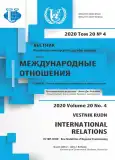The African Union and Peacekeeping in Africa: Challenges and Opportunities
- Authors: Apuuli K.P.1
-
Affiliations:
- Makerere University
- Issue: Vol 20, No 4 (2020): New Modalities of Regional Peacekeeping
- Pages: 667-677
- Section: THEMATIC DOSSIER
- URL: https://journal-vniispk.ru/2313-0660/article/view/320251
- DOI: https://doi.org/10.22363/2313-0660-2020-20-4-667-677
- ID: 320251
Cite item
Full Text
Abstract
About the authors
Kasaija Phillip Apuuli
Makerere University
Email: phillip.kasaija@chuss.mak.ac.ug
PhD in International Law, Associate Professor, Department of Political Science and Public Administration Kampala, Uganda
References
- Abrahamsen, R. (2013). Introduction: Conflict and Security in Africa. In: Abrahamsen, R. (Eds.). Conflict and Security in Africa. Suffolk: Currey. P. 1-13.
- Apuuli, K.P. (2013). The African Capacity for Immediate Response to Crises (AICRC) and the Establishment of the African Standby Force (ASF). Journal of African Union Studies, 2 (1-2), 63-88.
- Apuuli, K.P. (2019). The AU’s New Financing Mechanisms: Self-financing at Last? In: Onditi, F., Ben-Nun, G., D’Alessandro, C. & Levey, Z. (Eds.). Contemporary Africa and the Foreseeable World Order. Lanham: Lexington Books. P. 77-93.
- Arthur, P. (2017). Promoting Security in Africa through Regional Economic Communities (RECs) and the African Union’s African Peace and Security Architecture (APSA). Insight on Africa, 9 (1), 1-21. doi: 10.1177/0975087816674577
- Bachmann, O. (2011). The African Standby Force: External Support to an “African Solution to African Problems”? IDS Research Reports, 11 (67), 1-73. doi: 10.1111/j.2040-0217.2011.00067_2.x. URL: www.ids.ac.uk/files/dmfile/Rr67web.pdf (accessed: 06.08.2020).
- Bamidele, O. (2013). The Challenges of Peacekeeping in Africa: A Revisit. Strategic Review for Southern Africa, 35 (2), 117-134. URL: https://www.up.ac.za/media/shared/Legacy/sitefiles/file/46/1322/10bamidelepp117134.pdf (accessed: 06.08.2020).
- Boutros-Ghali, B. (1992). An Agenda for Peace: Preventive Diplomacy, Peacemaking and Peace-keeping. International Relations, 11 (3), 201-218. doi: 10.1177/004711789201100302
- Brubacher, M., Damman, E.K. & Day, C. (2017). The AU Task Forces: An African Response to Transnational Armed Groups. Journal of Modern African Studies, 55 (2), 275-299. doi: 10.1017/S0022278X17000040
- De Carvalho, G. (2016). African Peace Operations in Burundi: A Decade of Re-Hatting Experiences. In: Aboagye, F.B. (Eds.). A Comprehensive Review of African Conflicts and Regional Interventions. Addis Ababa: APSTA. P. 169-181.
- De Waal, A. (2008). Prospects for Peace in Darfur: A Challenge to the African Union. In: Adejumobi, S. & Olukoshi, A. (Eds.). The African Union and New Strategies for Development in Africa. New York: Cambria Press. P. 435-455.
- Diehl, P.F. (2007). New Roles for Regional Organizations. In: Crocker, C., Hampson, F.O. & Aall, P. (Eds.). Leashing the Dogs of War. Washington DC: USIP Press. P. 535-553.
- Feldman, R.L. (2008). Problems Plaguing the African Union Peacekeeping Forces. Defense & Security Analysis, 24 (3), 267-279. doi: 10.1080/14751790802321388
- Ferim, V. (2013). African Solutions to African Problems: The Fault Line in Conflict Prevention in Africa. In: Muchie, M., Lukhele-Olorunju, P. & Akpor, O. (Eds.). The African Union Ten Years After: Solving African Problems with Pan-Africanism and the African Renaissance. Pretoria: Africa Institute of South Africa. P. 143-156.
- Guicherd, C. (2007). The AU in Sudan: Lessons for the African Standby Force. New York: IPA. P. 1-35. URL: https://www.files.ethz.ch/isn/126721/au_in_sudan_eng_02_2007.pdf (accessed: 07.08.2020).
- Hillier, D. (2007). Africa’s Missing Billions: International Arms Flows and the Cost of Conflict. IANSA, Oxfam International and Saferworld Briefing Paper, 107, 1-38. URL: https://oxfamilibrary.openrepository.com/bitstream/handle/10546/123908/bp-africas-missing-billions-111007-en.pdf?sequence=1&isAllowed=y (accessed: 08.08.2020).
- Jackson, S. (2006). The United Nations Operation in Burundi (ONUB) - Political and Strategic Lessons Learned. New York: Conflict Prevention and Peace Forum. P. 1-34. URL: https://reliefweb.int/sites/reliefweb.int/files/resources/8D5EBEBA116301578525737800723F14-Full_Report.pdf (accessed: 08.08.2020).
- Khadiagala, G.M. (2015). Silencing the Guns: Strengthening Governance to Prevent, Manage and Resolve Conflicts in Africa. New York: International Peace Institute. P. 1-32. URL: https://www.ipinst.org/wp-content/uploads/2015/05/IPI_Rpt-Silencing_the_Guns-Strengthening_Governance_Africa.pdf (accessed: 07.08.2020).
- Mills, G., Obasanjo, O., Biti, T. & Herbst, J. (2019). Democracy Works: Turning Politics to Africa’s Advantage. London: Hurst & Company.
- Neethling, T. (1999). Towards Joint Ventures: Use of UN Observer Missions in Africa. In: Cilliers, J. & Mills, G. (Eds.). From Peacekeeping to Complex Emergencies: Peace Support Missions in Africa. Pretoria: South African Institute of International Affairs and the Institute for Security Studies. P. 27-44.
- Williams, P.D. (2009). The African Union’s Peace Operations: A Comparative Analysis. African Security, 2 (2-3), 97-118. doi: 10.1080/19362200903361937
- Williams, P.D. (2011). War and Conflict in Africa. Cambridge: Polity Press.
- Williams, P.D. (2017). Global and Regional Peacekeepers: Trends, Opportunities, Risks and a Way Ahead. Global Policy, 8 (1), 124-129. doi: 10.1111/1758-5899.12393
- Williams, P.D. (2018). Fighting for Peace in Somalia: A History and Analysis of the African Union Mission (AMISOM), 2007-2017. Oxford: Oxford University Press.
Supplementary files









